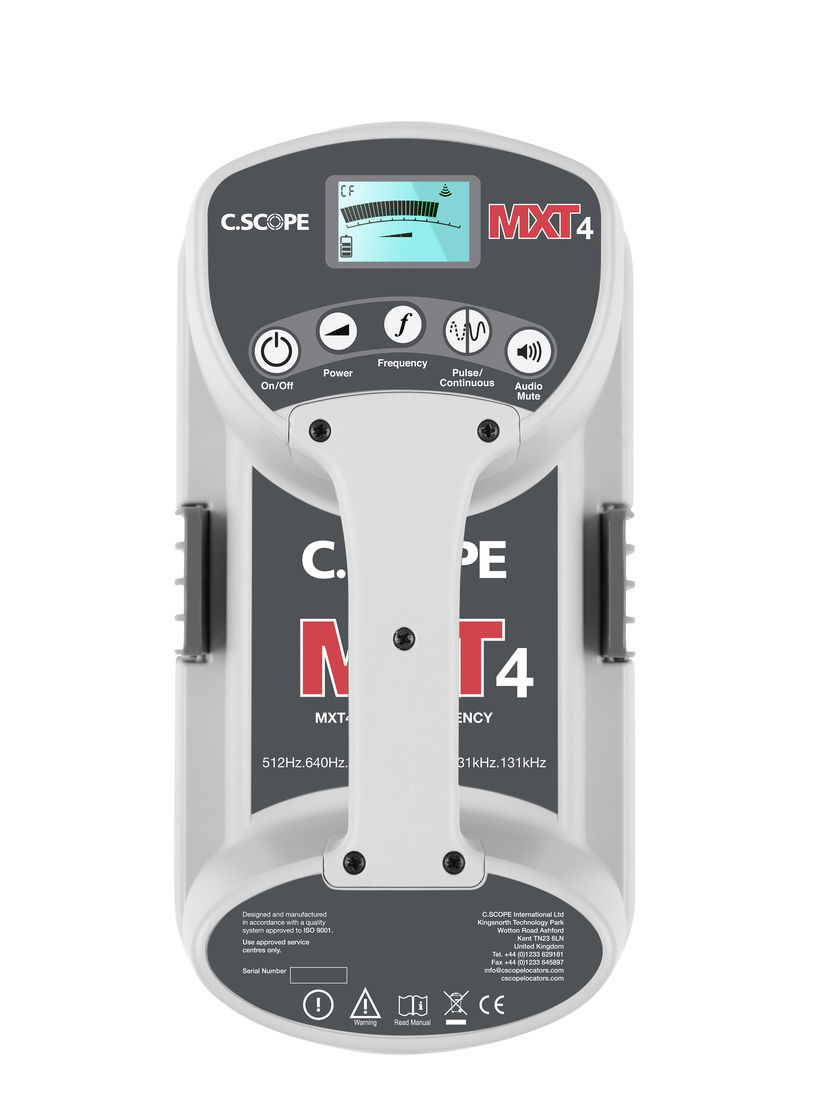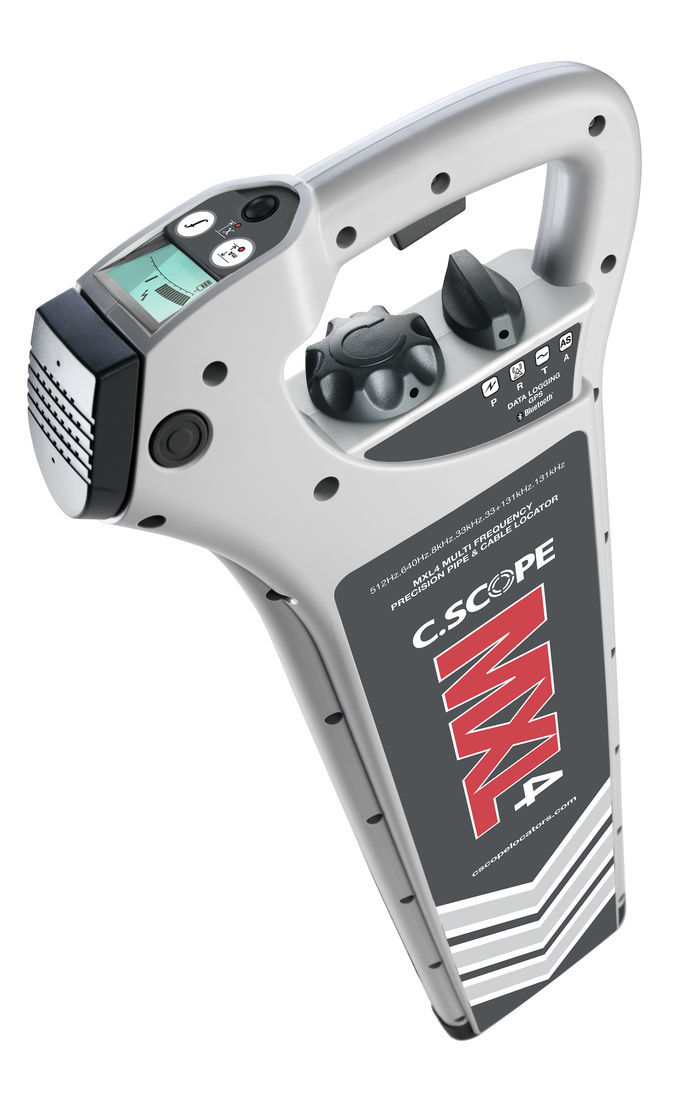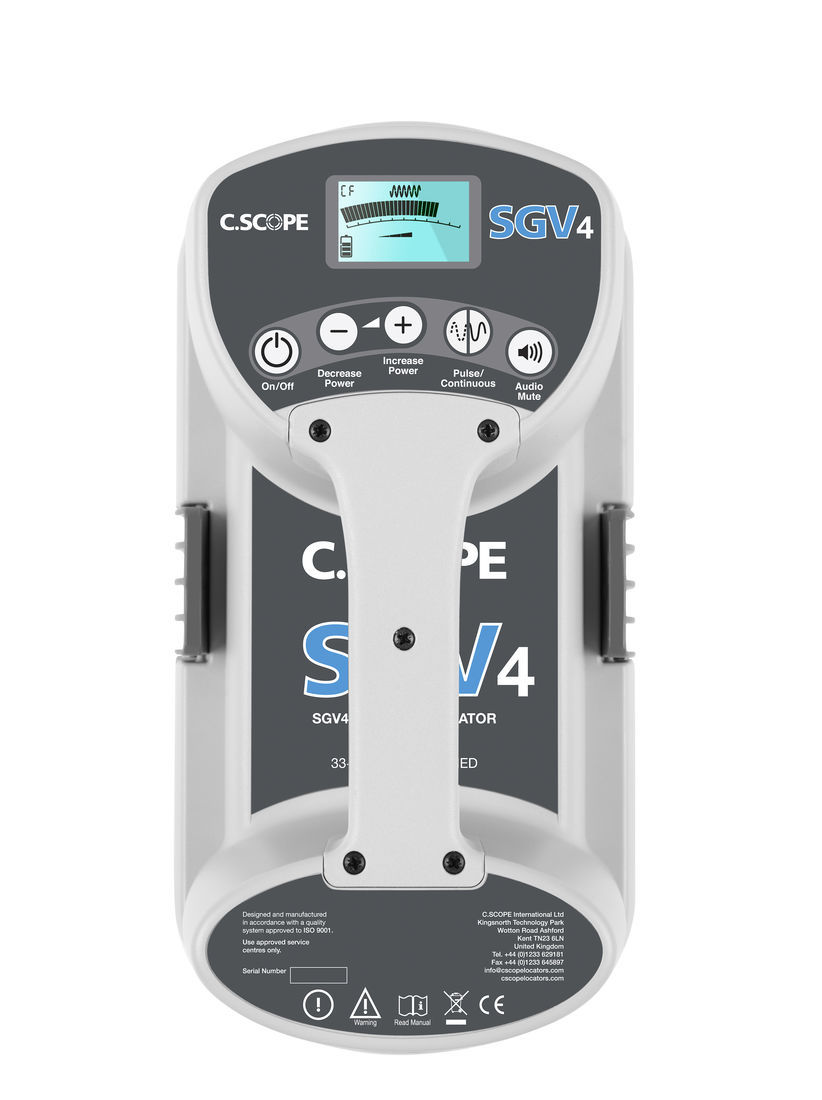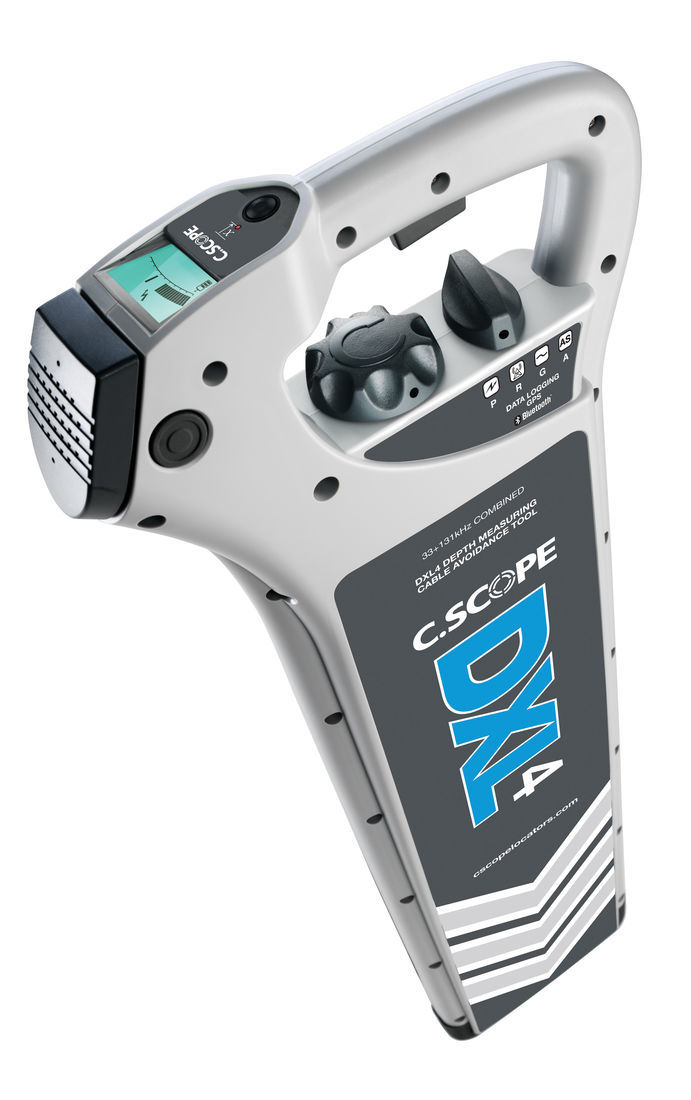



DXL4D PDF
The C-SCOPE DXL4D & MXL4D range of Cable Avoidance Tools.
Features:
- Power Mode.
- Radio Mode.
- Generator Mode - Combined 33+131kHz frequency detection improves utility detection. (DXL4D)
- Generator Mode - 512 Hz / 640 Hz, 8 kHz, 33 kHz, 131 kHz & Combined 33 + 131kHz (MXL4D)
- All Scan Mode.
- Accurate Depth Indication
- Automatic Noise Rejection.
- Dynamic Swing Sensor.
- Automatic Daily Self Test.
- Data Logging of all Locator activity.
- High resolution Liquid Crystal Display.
- No Calibration checks required.
- Three year Warranty (Conditions apply).
Four Detection Modes
The DXL4 has four detection modes to select from each mode providing it's own specific advantages:
POWER mode identifies buried electricity cables by detecting the mains frequency signal travelling along the cable itself, when current is being drawn.
RADIO mode detects re-radiated ?Radio? type signals that are often present on metal pipes and cables.
GENERATOR mode is used to detect the 33 + 131kHz signal applied to a a pipe or cable by a SGA4, SGV4D or MXT4D Signal Generator. The combination of a high frequency with the 33kHz signal enables small diameter cables to be located more easily. The Generator mode should also be used when detecting the signal from a C.Scope Sonde when tracing in non metallic pipes such as plastic and clay.
ALLSCAN mode detects ALL frequencies of signal from the lowest of the Power signals right up to and including 33kHz. This mode can detect unusual signals appearing in the frequency gaps between conventional Power, Radio and Generator modes and is invaluable as a ?final check? before excavation.
Human error can be a contributory factor associated with cable strikes. To address this issue, intelligent features such as an Automatic Daily Self Test function and a dynamic Swing Sensor help ensure that best working practices are adhered to and being applied on-site. The Data Logging option can also provide an invaluable insight into working practices and help to identify potential training requirements.
| Depth Measurement
When used with an SGA4, SGV4D or MXT4D Signal Generator the depth of buried pipes, cables and sondes can be indicated at the push of a button.
Dynamic Swing Sensor
The DXL4D/MXL4D recivers will sound a single tone to alert the operator that the Locator is being swung excessively. This will help operators maintain correct technique during every search.
Automatic Daily Self Test (ADST)
The DXL4D/MXL4D has comprehensive self test circuitry. ADST tests the Locator including the receiving aerials for correct performance each day when it is first switched on. As well as storing the test result for later reference if needed, the ADST gives the operator confidence that the Locator is working to its optimum before use at the start of each day.
Data Logging
The DXL4D/MXL4D is available with or without the option of Data Logging. The Data Logging versions will automatically record how and when it is being used. Over 12months of data (in normal use) can be stored before being overwritten. A full audit trail is kept of all activity so that it is possible to see when the Cable Avoidance Tool passed Self Tests, which Modes have been used, when, and for how long.
|
Data Log Transfer via USB
Data from the Data Logging versions can be transferred at any time to a PC for analysis via the data connection socket in the battery compartment.
Data Log Analysis
C.Scope's FREE to download XL2 Edition PC Toolkit allows manipulation of the stored data-logs into charts and graphs that illustrate all aspects of the use. The data can be used to show correct usage in addition to assisting the identification of actual operator behaviour and any training requirements.
LCD Clear Digital Display
The recievers have a large, clear and easy to read backlit LCD mounted behind a protective polycarbonate lens. The display indicates detection mode, signal peak level, depth, signal strength and battery condition. It also displays the Automatic Daily Self Test results.
Fingertip Controls
The receivers ergonomic controls offer easy singlehanded sensitivity adjustments and mode selection.
Detachable Speaker
The speaker can be easily detached for use in noisy work environments.
| Data Connection
The DXL4D/MXL4D features a data connection socket for transferring data to a PC using the C.Scope XL2 Edition PC Toolkit.
Robust and Durable Construction
The receivers twin wall construction is robust and durable. It also provides IP65 standard protection against dust and water ingress.
Calibration
The DXL4D/MXL4D does not require periodic re-calibration helping to reduce running costs and downtime.
System Validation Certification
The C.Scope XL2 Edition PC Toolkit allows owners to print a System Validation Certificate by connecting the Cable Avoidance Tool to a PC via USB. The results are generated from the ADST results that are stored on the Cable Avoidance Tool.
Service
Full warranty, service and maintenance is available through Altech Distributors here in Australia.
Warranty
All C-SCOPE Products come with a three year Warranty (conditions apply). |
Services
PIPE & CABLE LOCATOR:
Repair & Calibration - Function Check - Training
Repair & Calibration
Altech Distributors is the approved C.Scope service centre in Australia for the maintenance, repair and calibration of C.Scope Pipe and Cable Locators, Receivers, Signal Generators, Transmitters and Accessories.
The accuracy of electronic components used in all instruments naturally drifts over time. Therefore, it is necessary to calibrate instruments at regular intervals as defined by the manufacturer. Calibration improves the measurement performance of an instrument. Benefits of maintaining properly calibrated equipment include reduced measurement errors and consistency between measurements. To help you meet your calibration needs, Altech Distributors provides calibration support and services that include manual calibration procedures, and use of a factory built and calibrated function checkers, designed specifically for their products.
Altech Distributors strives to achieve the highest level of quality in every product it sells. Before a product leaves our factory, it undergoes testing and inspection.
Latest Series C-SCOPE Locators (Grey Series)
Following the successful introduction of a new range of equipment featuring a digital processing core - we can confirm that these new products do not require annual recalibration.
The following products DO NOT require annual calibration:
- C.Scope CXL Cable Avoidance Tool (part number ZCSCXLCAT-33G)
- C.Scope DXL Cable Avoidance Tool (part number ZCSDXLCAT-33G)
- C.Scope MXL Locators (part numbers ZCSMXL-33-8-640 and ZCSMXL-33-8-512)
- C.Scope SGA Grey Signal Generator (part number ZCSSGA-33G)
- C.Scope One Watt SGV Signal Generator (part number ZCSSGV1-33G)
- C.Scope MXT Transmitters (part numbers ZCSMXT-33-8-640 and ZCSMXT-33-8-512).
We continue to recommend that the following C.Scope products DO require calibration
every 12 months:
- C.Scope Cable Avoidance Tool (part number ZCSCAT-33),
- C.Scope Cable Avoidance Tool XD with depth measuring (part number ZCSCATXD-33)
- C.Scope SGA Signal Generator (part number ZCSSGA-33)
- C.Scope SGV Signal Generator (part number ZCSSGV-33)
- C.Scope Function Checker (part number YIRFC).
Put simply, all C.Scope Locators and Signal Generators with a grey case DO NOT require annual recalibration and all C.Scope Locators and Signal Generators with a black case DO require annual recalibration.
C-Scope Locator Function Checks
It is recommended that the operation of the C.Scope Cable Avoidance Tool and Signal Generator is checked before use.
These checks DO NOT guarantee full system performance. The Cable Avoidance Tool and Signal Generator should be returned to the manufacturer or an approved agent for recalibration every 12 months.
Battery Condition
Check by depressing the On/Off switch beneath the handle. The display will show at least one solid segment if the batteries are ok. Ensure power on tone is heard.
Power Mode
Select Power Mode. Set Sensitivity fully clockwise and point the body of the C.Scope Cable Avoidance Tool at a fluorescent light from a distance of 1m. Switch the light on. A loud tone should be heard and the display should read greater than 50% full scale. Reducing the sensitivity should cause the displayed reading to reduce and the tone to cut out.
Radio Mode
Select Radio Mode. Set the Sensitivity fully clockwise and, from a distance of less than 0.25m, point the unit at a metal conductor of length greater than 100m (for example a pipe or cable). A warbling tone should be heard. The display should read greater than 50% full scale.
Generator Mode
Locate an outdoor test area that is free from extraneous fields resulting from overhead and underground cables. The area should also not be near fences, steel framed buildings, or on reinforced concrete as the signal will be reduced.
Place the Signal Generator on the ground in the normal orientation and switch on - a tone should be heard. Set to Continuous and ensure highest output power is selected.
With the C.Scope Cable Avoidance Tool in the orientation shown, and Sensitivity rotated.
Depth Measurement Checks
An area free of services, metal structures, etc should be chosen (beware of reinforced car parks). A search with the C.Scope Cable Avoidance Tool in all 3 modes will help confirm the absence of other services. An insulated cable or wire 20m+ (not supplied) is laid out on the ground surface and the far end connected to a ground stake and earthed. The near end is connected to the red Connected Mode lead.
The black ground Lead should be laid at right angles to the 20m wire and earthed at the far end with a ground stake. The plug should be inserted in the connector on the Signal Generator.
The Signal Generator is turned on with lowest power, and continuous mode selected. The C.Scope Cable Avoidance Tool should then be held vertically above the longer wire, approximately midway along it, ie. 10m from the Signal Generator.
The depth can then be measured. It is best to make a few readings at different depths. (Beware - metal step ladders affect the accuracy!)
Signel Generator Function Checks
Battery Condition
Select Continuous. Good batteries will be shown by a loud clear audio tone. Bad batteries give an interrupted audio tone. On the SG-V the display will show at least one solid segment if the batteries are ok.
Induced Mode
This can only be checked in conjunction with a C.Scope Avoidance Tool as described in Locators Function Check.
If the unit does not meet the results required, repeat the test with another C.Scope Cable Avoidance Tool to determine whether the Signal Generator is suspect.
Connected Mode
Set the minimum output level, insert the connection lead and the long earth lead and then connect the red lead to the long earth lead to create a short circuit. The pitch should change to a low tone.
The leads should be arranged to create an open loop on the ground of approximately 1m diameter. Check that a signal can be detected by the Cable Avoidance Tool (in Generator Mode) when pointed closely at the loop.
C-Scope Training
Altech offers a range of training for your operators and training personnel and is available on your site, or at our Office. Training is carried out by a qualified instructor and each trainee receives a certificate to confirm they have received the training.
Aim
To ensure candidates understand the need to use location equipment and to instruct them to operate pipe and cable locators in an accurate and safe manner.
Duration
Typically the full course duration is 4 hours. Refresher course being 2.5 Hours
Candidate Numbers
Up to 10 candidates can be trained in a single course.
Venue
- Our Training Facility:
- We can provide training at our office in Lilydale Victoria.
- We can provide training at our office in Lilydale Victoria.
- Customers Address:
- No special facilities are needed apart from a suitable room to allow the theory to be presented without disturbance. Access to an area where there are buried services is also required. (Street with buried telecommunication cables, power cables, water and/or gas services.
Certificates
Upon completion of the course each trainee will be provided with a certificate to confirm they have completed the course.
Content
The course consists of theoretical and practical training involving hands on use of the actual locators to detect and trace the route of buried services. The actual agenda is summarised below:
Introduction
This will cover the different types of buried services that exist, current legislation concerning detecting buried services, the safety implications of not using a locator plus ancillary locating work to be done (use of “Dial Before You Dig” cable plans, and observation of street fixtures etc.)
THEORY: A general overview of how locators work followed by a step by step explanation of exactly what can and cannot be detected on the different modes. Typically use of the Cable Avoidance Tool alone is covered first followed by use of a Signal Generator. Accessories that are appropriate to the work that the candidates carry out will be included. Correct maintenance and care of the equipment is also discussed.
Practical
Candidates are shown the correct way to handle and operate the equipment on all modes before being given the opportunity to gain hands-on experience themselves. Any bad habits will be quickly picked up and corrected. Time is spent practising the techniques of detecting signals, pinpointing their source and then finally tracing the route of the service. A Signal Generator and the relevant accessories will also be used.
Special Requirements
Our training is derived from experience in using locators in a diverse range of situations over many years and we bring this experience to the training course. We always seek to make our courses specific to the type of work that the candidates are involved with and encourage candidates to participation in discussion on the subject of locating throughout the course. The training is carried out in a friendly, relaxed manner and the theoretical content is covered in simple, easy to understand terms.
For more information on our training services please contact us.
